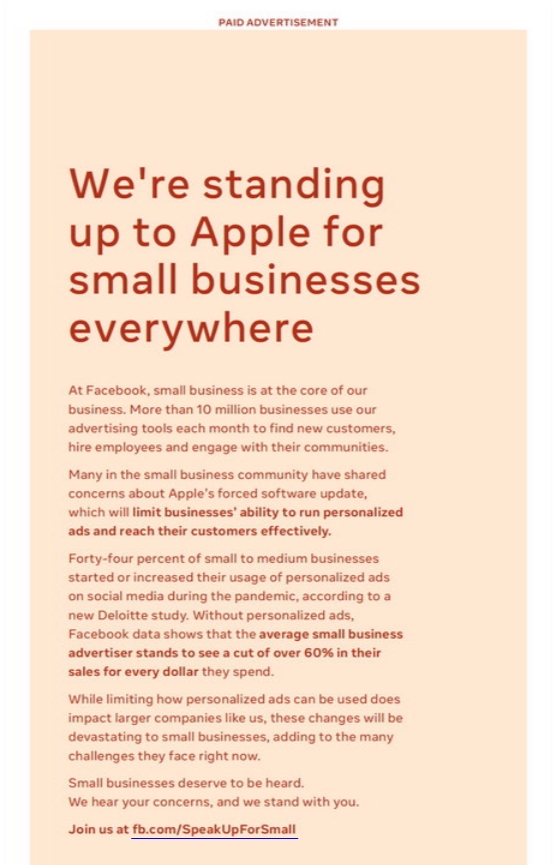Answer

Dec 23, 2020 - 09:48 AM
Here are my quick thoughts.
1. It is going to affect targeting and you will not be able to target based on a users interests. This will make your ads less effective and increase cost per acquisition. Facebook ran an ad in the Wall Street Journal (below) and estimates that, with the changes, small businesses will see a 60% reduction in sales for each dollar they spend.

2. It will likely affect pixels and conversion tracking. Without proper attribution, the effectiveness of your ads will be further reduced and you will face the problem articulated by legendary ad man and merchandiser John Wannamaker a century ago: “Half the money I spend on advertising is wasted; the trouble is I don't know which half.”
3. Unable to turn a profit, many small businesses will reduce their ad spend on Facebook or stop advertising entirely. Facebook will in turn respond by showing many more ads to make up for lost revenue and stay in Wall Street's good graces. Facebook has increased the number of ads showing in your feed by 30% year over year for the last few years and will likely ratchet this up even more. Users might then revolt and leave en masse, continuing the downward spiral.
4. Alternatively, most iPhone users simply won't care and won't do anything, and so it will be business as usual for us advertisers, unless Apple makes the default behavior not to share personal information requiring users to turn on sharing. Right now the default is to share and one must explicitly opt out.
What do you think?
1. It is going to affect targeting and you will not be able to target based on a users interests. This will make your ads less effective and increase cost per acquisition. Facebook ran an ad in the Wall Street Journal (below) and estimates that, with the changes, small businesses will see a 60% reduction in sales for each dollar they spend.

2. It will likely affect pixels and conversion tracking. Without proper attribution, the effectiveness of your ads will be further reduced and you will face the problem articulated by legendary ad man and merchandiser John Wannamaker a century ago: “Half the money I spend on advertising is wasted; the trouble is I don't know which half.”
3. Unable to turn a profit, many small businesses will reduce their ad spend on Facebook or stop advertising entirely. Facebook will in turn respond by showing many more ads to make up for lost revenue and stay in Wall Street's good graces. Facebook has increased the number of ads showing in your feed by 30% year over year for the last few years and will likely ratchet this up even more. Users might then revolt and leave en masse, continuing the downward spiral.
4. Alternatively, most iPhone users simply won't care and won't do anything, and so it will be business as usual for us advertisers, unless Apple makes the default behavior not to share personal information requiring users to turn on sharing. Right now the default is to share and one must explicitly opt out.
What do you think?








Add New Comment